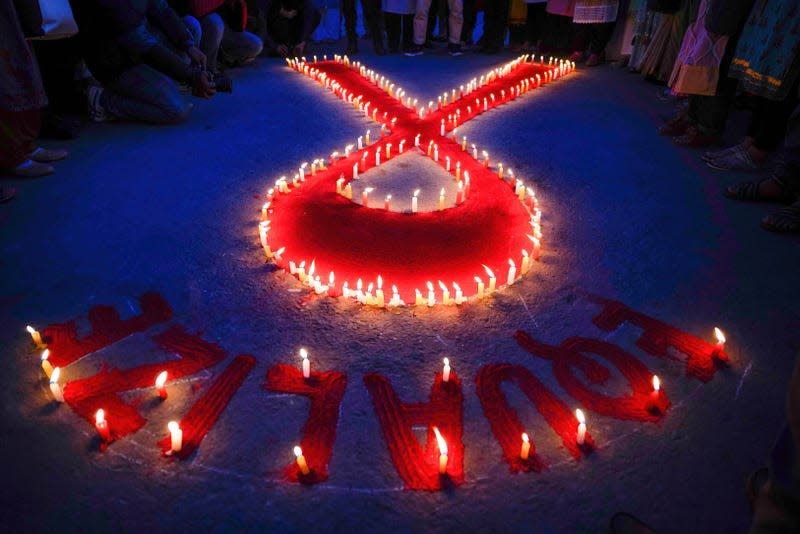Center Black People on World AIDS Day

In 2021, 38.4 million people worldwide were living with HIV. 650,000 people died from an HIV-related illness worldwide in 2021. In addition, 15% of all people living with HIV in 2021 did not know their status.
The theme for this year’s World AIDS Day is Equalize. This theme emphasizes the importance of addressing the inequalities that sustain the HIV/AIDS epidemic. Since the virus was introduced in the late 1980s, Black people have tested positive and died disproportionately compared to all other racial/ethnic groups.
Read more
That Black people are still dying at extreme rates, given the scientific, medical, and social progress that has been made should sadden each of us. We have the ability to address some of the inequalities that contribute to disproportionate impact. Some of these inequalities require the intervention of professionals and elected officials to address. These include undemocratized health care, systemic racism in the health care system, gender bias, LGBTQ+ stigma, bias, and phobia, as well as the criminalization of HIV.
The HIV epidemic disproportionally affects Black people, Black women and girls, and members of the LGBTQ+/SGL community. This means those who live at the intersection of those identities are especially vulnerable. Of the 1.2 million people living with HIV in the U.S., 476,300 are Black. In 2019, of the 36,801 new HIV diagnoses, 42% (15,305) were among Black people, and 26% (9,421) were among Black gay, bisexual, and same-gender loving men.
Black women made up 54% of new diagnoses among Black women in the U.S. and 54% of those living with HIV. Most new diagnoses among transgender people in the U.S. are among Black transgender people. Black people only make up 13% of the U.S. population, so these numbers should concern all Black people and those who purport to love us.
In addition to HIV/AIDS, our community has been hit hard by the recent MPox outbreak. 40% of people diagnosed with MPox had HIV. People living with HIV are at increased risk of severe MPox if exposed. Black people had the highest rates of new MPox cases. However, Black people have received fewer MPox vaccines. Fighting multiple battles to ensure holistic health and well-being can compound stress and exacerbate the impact of systemic racism, which impacts not only individuals but our families, communities, and the country.
Together we can end the disproportionate impact of HIV/AIDS on our community to ensure that all Black people live long and healthy lives. One way to accomplish this goal is to ensure medical providers are competent, which includes cultural competence, and are equipped to provide care for the beautifully diverse members of our community.
Providers should be competent and confident enough to make different testing options clear, including at-home testing as an option for those who feel more comfortable testing and receiving results in the privacy of their own space. Many Black people have experienced racism in medical settings, and being able to test and see results in a safe space can ease some of the anxiety they can feel while getting medical care. Ensuring patients who test at home are connected to communities of care, regardless of the outcome, is also incredibly important. Data shows that those of us who are connected to communities of care have better health outcomes. In addition, it is important for all of us to understand and for medical providers to emphasize that testing positive is not a death sentence. Black people who are connected to care are thriving while living with HIV.
Ending the HIV/AIDS epidemic in the Black community requires all hands on deck. Each of us can play our part in reducing the stigma surrounding HIV/AIDS by having open and honest conversations about comprehensive health and wellness, including sexual health. Too often, we don’t talk with friends, family, or as a community about sex, pleasure, and protection. Conversations can truly save lives, and it’s important that we start talking to stop HIV.
NBJC developed the Words Matter HIV Toolkit to facilitate conversation and community building within the Black community. This toolkit is designed to help create safe and brave spaces to talk about HIV/AIDS, describes how language contributes to stigma and the disproportionate rates of HIV/AIDS in the Black community and offers affirming language to help facilitate what can sometimes be difficult but life-saving conversations and community building efforts. Download the toolkit at nbjc.org and start talking to end HIV today.
Finally, to end the HIV epidemic, each of us must know our status. Doctors recommend getting tested for HIV every 3 to 6 months. Visit NBJC.org to find a testing site near you or request a free at-home HIV testing kit. You will find more information about how HIV/AIDS affects Black people, our families and communities, as well as actions you can take on World AIDS Day and beyond via our website. Whatever you do, do something to acknowledge WORLD Aids Day and its impact on Black people globally.
More from The Root
Sign up for The Root's Newsletter. For the latest news, Facebook, Twitter and Instagram.

